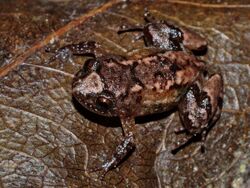Biology:Nyctibatrachus beddomii
| Nyctibatrachus beddomii | |
|---|---|

| |
| Dorsal view | |
| Scientific classification | |
| Kingdom: | Animalia |
| Phylum: | Chordata |
| Class: | Amphibia |
| Order: | Anura |
| Family: | Nyctibatrachidae |
| Genus: | Nyctibatrachus |
| Species: | N. beddomii
|
| Binomial name | |
| Nyctibatrachus beddomii (Boulenger, 1882)
| |
| Synonyms | |
|
Nannobatrachus beddomii Boulenger, 1882 | |
Nyctibatrachus beddomii (common names: Beddome's night frog, pigmy wrinkled frog, Beddome's dwarf wrinkled frog, and Tirunelveli's hill frog) is a species of frog in the family Nyctibatrachidae.[2]
Taxonomy
The epithet or specific name, beddomii, honors Colonel Richard Henry Beddome (1830–1911), United Kingdom naturalist and military officer.
The species is one of 34 species in the night frog genus Nyctibatrachus, in the robust frog family Nyctibatrachidae.[3] Within its genus, it is part of a clade (group formed by all of a common ancestor's descendants) that includes N. manalari, N. robinmoorei, N. anamallaiensis, N. sabarimalai, and N. pulivijayani. It is basal within the group and is sister (most closely related) to a clade that includes the other five species.[4][5] The following cladogram shows relationships among these species, according to a 2017 study.[4]
| |||||||||||||||||||||||||||||||||||||
Size
Adult can length up from 13–18 mm (0.51–0.71 in).
Distribution and habitat
It is endemic to southern Western Ghats of India .[1][2]
Nyctibatrachus beddomii are semi-terrestrial frogs found in the leaf-litter but also under rocks and logs in evergreen and semi-evergreen moist and deciduous forests.[1] The small sized frog is commonly seen in swampy areas and shallow waterlogged areas along forest streams. Call is a faint 'tink-tink' repeated several times, largely at night.[citation needed]
Conservation status
It is threatened by habitat loss caused by logging and clearing for agriculture.[1] It listed as an Endangered species by the IUCN.
References
- ↑ 1.0 1.1 1.2 1.3 S.D. Biju, Sushil Dutta, M.S. Ravichandran (2004). "Nyctibatrachus beddomii". IUCN Red List of Threatened Species 2004: e.T58396A11767424. doi:10.2305/IUCN.UK.2004.RLTS.T58396A11767424.en. https://www.iucnredlist.org/species/58396/11767424. Retrieved 16 November 2021.
- ↑ 2.0 2.1 Frost, Darrel R. (2013). "Nyctibatrachus beddomii (Boulenger, 1882)". Amphibian Species of the World 5.6, an Online Reference. American Museum of Natural History. http://research.amnh.org/vz/herpetology/amphibia/?action=names&taxon=Nyctibatrachus+beddomii. Retrieved 3 December 2013.
- ↑ Frost, Darrel R. (2023). "Nyctibatrachus" (in en). American Museum of Natural History. doi:10.5531/db.vz.0001. https://amphibiansoftheworld.amnh.org/Amphibia/Anura/Nyctibatrachidae/Nyctibatrachinae/Nyctibatrachus.
- ↑ 4.0 4.1 Garg, Sonali; Suyesh, Robin; Sukesan, Sandeep; Biju, Sd (2017-02-21). "Seven new species of Night Frogs (Anura, Nyctibatrachidae) from the Western Ghats Biodiversity Hotspot of India, with remarkably high diversity of diminutive forms" (in en). PeerJ 5: e3007. doi:10.7717/peerj.3007. ISSN 2167-8359. PMID 28243532.
 This article incorporates text from this source, which is available under the CC BY 4.0 license.
This article incorporates text from this source, which is available under the CC BY 4.0 license.
- ↑ Kumar, K.S. Pavan; Vishwajith, H.U.; Anisha, Anand; Dayananda, G.Y.; Gururaja, Kotambylu Vasudeva; Priti, Hebbar (2022-11-15). "A new cryptic species of Nyctibatrachus (Amphibia, Anura, Nyctibatrachidae) with description of its tadpole from the central Western Ghats, India". Zootaxa 5209 (1): 69–92. doi:10.11646/zootaxa.5209.1.4. ISSN 1175-5334. PMID 37045404. https://www.mapress.com/zt/article/view/zootaxa.5209.1.4.
Wikidata ☰ Q2244734 entry
 |

